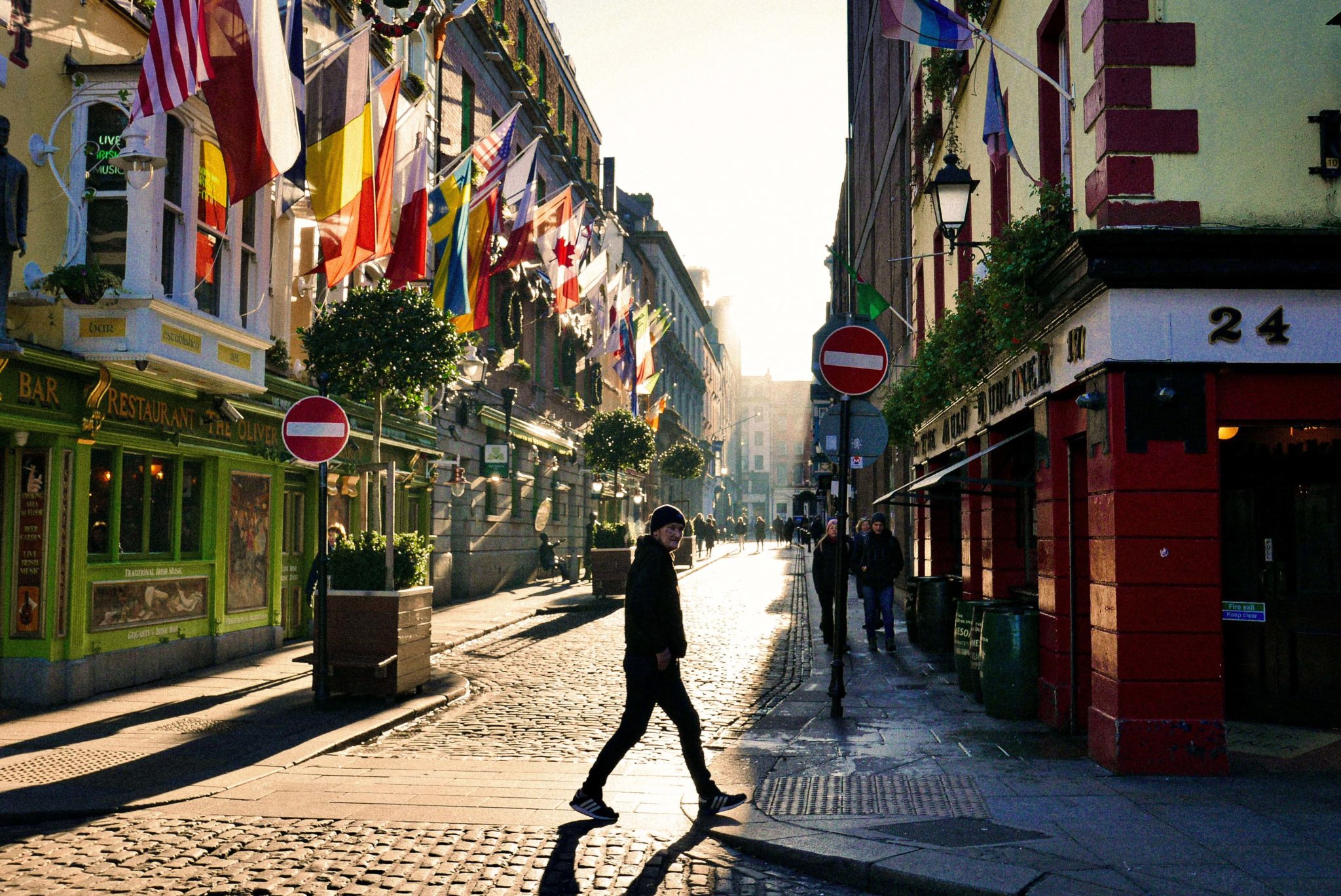- Culture
- 11 Sep 23

Being a student should be fun. But it is also a time when your understanding of the world is being shaped, even as the landscape shifts and changes all around you. There are challenges ahead, and the threat of darkness is only ever over the horizon. The answer is to be open, look far and wide for information and inspiration – and aim, in whatever way you can, to make the world a better place.
And so, summer ends. An old friend came for dinner the other night. Her niece is off to Madrid for this academic year, thanks to Erasmus, one of the European Union’s greatest gifts to students.
Our friend remembered her own Erasmus exchange, to Marseille. It opened her mind, her eyes, her ears. Back then it was so much more cosmopolitan and multicultural than Dublin. She adored the music, from all across northern and western Africa especially, but also from South and Central America and, unexpectedly, South East Asia.
Humans made music before they made words, she said. So, music communicates where words fail. And it’s true. Of all the arts, music matters most to students. When the music flows we meet the known and the unknown, the familiar and the unexpected, the flesh and the spirit, rhythm and reverie. You dance and laugh and let go of yourself for a while, all the better to find yourself for life.
CULTURAL BIODIVERSITY
In our friend’s case, through music she also found the world, and a heightened awareness of the great ebbs and flows of history’s tides. That music was in Marseilles for a reason: imperialism.
An empire isn’t just about economic and military dominion. It’s also social and cultural and much of Africa is still Francophone. Rebelling Niger soldiers last week hung out signs saying “A Bas la France, Vive Poutine” – in French, down with France, long live Putin.
Advertisement
History, they say, is written by the winners. And so, the biases and bigotries of the imperial past still shape perceptions in the northern hemisphere of both Africa and South America.
But change is afoot. The colonial powers are ebbing and now, so too is the history they left behind. About time, you say? Indeed. But better late than never, and it may herald good news on many fronts, including climate change.
Perhaps the rest of the world is catching up on the music. The vitality, inventiveness, expressiveness and sheer infectiousness of music being made in Africa and South America and the Caribbean islands has been embraced with open arms by knowledgeable music fans for decades.
And the whole of music is the richer for it. Think of it as cultural biodiversity, fuelled by cross-pollination.
It’s a welcome counterpoint to the dominant view in mainstream political and economic discourse of the global south as undeveloped, generally undemocratic and troubled, their many dysfunctions diverting aid, fuelling conflict and driving migration and the refugee crisis.
There’s certainly trouble aplenty, but there’s also great vitality and possibilities. Many of these morbid undertones derive from the imperial histories, draped as they are in exploitation, slave trade, racism, greed and denial. Well, thankfully that’s not a guilt-burden Irish students need to shoulder.
That said, we shouldn’t be too smug. After all, we had the missions, didn’t we? Weren’t they also an imperialist project, albeit religious rather than political?
Advertisement
And then there’s the Anglosphere, the most pervasive global cultural empire, and we’re part of it.
 Trinity College Library. Photo by: Sean Kuriyan
Trinity College Library. Photo by: Sean KuriyanOUTWARD GAZE
It’s a paradox: most Irish people are (and have long been), open and generous to visitors, curious and well-informed about the world, comfortable and respectful in foreign places and company.
As a result, we’re highly regarded and welcome in Europe and around the world. Our graduates are much sought after. On the global stage, we have developed a soft power that allows us punch far above our weight.
And yet, we’ve always been slipshod when it came to languages other than English. Maybe it’s the old colonial thing. Or that it’s just too easy – it is often said that we speak better English than the Brits, our accents are (mostly) more understandable and we don’t talk down to the rest of the world. What’s not to like?
Advertisement
The thing is academics will tell you that Irish students seem more, not less, Anglophone as the years go by. Is it because English is the lingua franca of the internet, social media and technology and young Irish people are as immersed in the digital world as any? Perhaps, but it’s a problem. Language doesn’t just express our thoughts and beliefs, it also helps shape them.
And, inevitably, because algorithms organise our news and culture feeds now, our world view is increasingly contoured by the Anglosphere, that is, the deep and omnipresent cultural legacy of empires past and present. That might be good in some ways but, for example when it comes to political discourse about the global south, it’s bad.
So, we need to get out more and we need to keep looking at the world through diverse lenses.
And here we return to the student life, and hopefully to the outward gaze fostered by Erasmus.
You’re moving to a new phase of your life, in an institution that’s more populous than many a large town. And almost everyone is in the same age bracket as yourself! Even the most open, supportive and encouraging family or secondary school can’t offer the intellectual, cultural and social opportunities you’ll encounter in college.
Being a student should involve much more than keeping your head down and getting the results. Nor should it just be about swanning about, getting drunk or stoned or shagged, pleasurable as those dalliances can certainly be.
 Temple Bar. Photo by: Vitalii Mazur
Temple Bar. Photo by: Vitalii MazurAdvertisement
NEW CHALLENGES
No indeed. Being in college is about new challenges, questions, skills and knowledge. And friendships. It is about experiencing and doing, pushing your boundaries, taking risks and assuming positions, finding method, perspective and awareness. And building purpose.
You’re learning to fashion the future: yours and everyone’s. It should be heady, even intoxicating. Think of the discovery, collaboration, innovation, creativity, science and enterprise!
Having those among us who can name the problems and shout about them is important. We can’t shirk the issues.
But – and this is the bigger challenge – we also need those who find answers. As the future unfolds and the crises mount we’ll need protest with a purpose – that is, not for its own sake, but to find solutions and effect positive change.
Yelling is easy, it’s visceral and maybe even kinda pleasurable. Thinking and doing is harder. But that’s what the world needs now.
Among the issues, at the granular level, there’s the often terrifying world of the self; the tyranny of social media, of not putting a foot wrong, of fitting in even if you’re natural habitat is outside the circle; the inherent conflicts of of being an individual and a member all at the same time.
Advertisement
Pull the camera back and wider issues emerge, in particular the indeterminacy that pervades your life between 18 and 25 (at least) and the lack of housing.
The Government is copping most of the flak on the latter, but college authorities shouldn’t escape student anger. After all, colleges are directly involved in housing students and in too many cases entered into relationships with developers that haven’t served the core purpose well.
As we widen the view again, this being the 21st century, we find the Four Horsemen of the Apocalypse on the rampage: war, famine, disease and climate change.
Hang on, there’s two more. There’s the omnipresence of drugs and how they and their merchants hollow out our communities and society.
And there’s AI, something we all know a little about but not a lot. But it’s going to change everything and sooner than we think.
Most students in college now were born in this century and will, all things being equal, see it out. Jaysus knows what new obstacles will emerge as the decades pass – but the world this year’s freshers leave will bear little resemblance to the one they entered.
It may all work out well but, individually and collectively, this year’s school leavers will need every gram of resilience, flexibility and inventiveness.
Your student days are the start of the journey.
Advertisement
Read the full Student Special in the current issue of Hot Press – out now:










